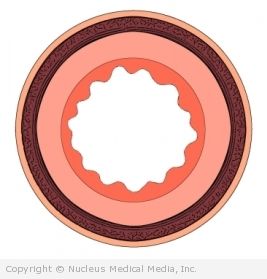(Celiac Sprue; Nontropical Sprue; Gluten-Sensitive Enteropathy)
Celiac disease – Definition
Celiac is an autoimmune disease of the digestive tract. With Celiac, eating food with gluten damages little protrusions in the small intestine. These protrusions, called villi, absorb nutrients from foods. The condition affects absorption of all nutrients. Untreated patients often become malnourished.

Celiac disease – Causes
Doctors do not fully understand what causes celiac disease. Eating gluten seems to be involved. There is most likely a genetic factor. Patients with specific genes develop the disease after exposure to gluten. There is some evidence that earlier exposure in infancy causes more severe disease than later exposure.
Celiac disease – Risk Factors
These factors increase your chance of having celiac disease.
- Family members with celiac disease
- History of another autoimmune disease, such as:
- Type 1 diabetes
- Autoimmune thyroid disease
- Lupus
- Dermatitis herpetiformis — a skin condition associated with celiac disease
- Rheumatoid arthritis
Celiac disease – Symptoms
Symptoms vary and may start in childhood or adulthood. Children often have different symptoms than adults. Symptoms may not develop if a large section of the intestine is undamaged. Malnutrition may produce the first signs of the condition, which are often the most serious.
Signs and symptoms may include:
In Children
- Abdominal pain
- Nausea, lack of appetite
- Vomiting, in later stages of disease
- Diarrhea
- Malodorous, bulky stools
- Irritability
- Failure to thrive (in infants)
- Short stature
- Delayed puberty
- Anemia, pale skin
- Seizures
- Hepatitis
- Angular cheilitis — cracked sores in the corners of the mouth
- Aphthous ulcers — shallow sores in the mucous membranes of the mouth
In Adults
- Bloating
- Gas
- Diarrhea
- Foul-smelling, light-colored, oily stool
- Weight loss
- Hearty or a poor appetite
- Fatigue
- Abdominal pain
- Bone pain
- Behavior changes
- Muscle cramps and joint pain
- Seizures
- Dizziness
- Skin rash
- Dental problems
- Missed menstrual periods
- Infertility
- Altered sensation in the limbs
- Anemia
- Osteopenia
Celiac disease – Diagnosis
The doctor will ask about your symptoms and medical history. A physical exam will be done. Symptoms are similar to those of other conditions. It may take a long time to get a diagnosis. Early diagnosis and treatment reduce the risk of complications.
Tests may include:
- Blood tests — to detect the presence of gluten antibodies (produced by the immune system) and look for evidence of malabsorption (anemia, vitamin and mineral deficiencies)
- Stool tests — to check for evidence of malabsorption
- Endoscopy — a thin, lighted tube inserted down the throat to examine the intestine
- Biopsy — removal of a small sample of tissue during endoscopy to test for inflammation and tissue damage
- Repeat biopsy — a biopsy performed several weeks after treatment begins to confirm the diagnosis
Celiac disease – Treatment
A life-long, gluten-free diet is the only treatment for celiac disease. Fortunately, it is very effective. Symptoms usually go away within days of starting the diet. Healing of the villi may take months or years. Additional intake of gluten can damage the intestine, even if you have no symptoms. Delayed growth and tooth discoloration may be permanent. Nutritional supplements, given through a vein, may be needed if the intestinal damage is significant and does not heal. Since gluten is added to many foods, the diet can be complicated and often frustrating. Some patients find support groups helpful.
Dietary Changes
You must avoid all foods containing:
- Wheat
- Rye
- Barley
This includes most bread, pasta, cereal, and processed foods. Special gluten-free breads and pastas are available. They are made with potato, rice, soy, or bean flour. Patients who are lactose intolerant before their small intestine heals need to avoid milk products. A dietitian can assist you with meal planning.
Gluten is found in some unexpected foods and beverages. Carefully read all labels. Other foods with gluten include:
- Flavored coffee
- Beer
- Tuna in vegetable broth
- Packaged rice mixes
- Some frozen potatoes
- Creamed vegetables
- Commercially prepared vegetables, salads, and salad dressings
- Pudding
- Some ice cream
- Many other products
Ordering at restaurants can be especially challenging, since many foods on the menu may surprisingly contain gluten.
Screening and Supplements
Patients with celiac disease should be tested for nutritional deficiencies. Bone density testing may also be needed. If vitamin or mineral deficiencies are found, the doctor may recommend taking supplements. Once the disease is under control with a gluten-free diet, however, this is often not necessary.
Celiac disease – Prevention
There are no guidelines for preventing celiac disease because the cause is not understood. If celiac disease runs in your family, ask your doctor about a screening test. The earlier you start the gluten-free diet, the less damage there will be to the intestine.
